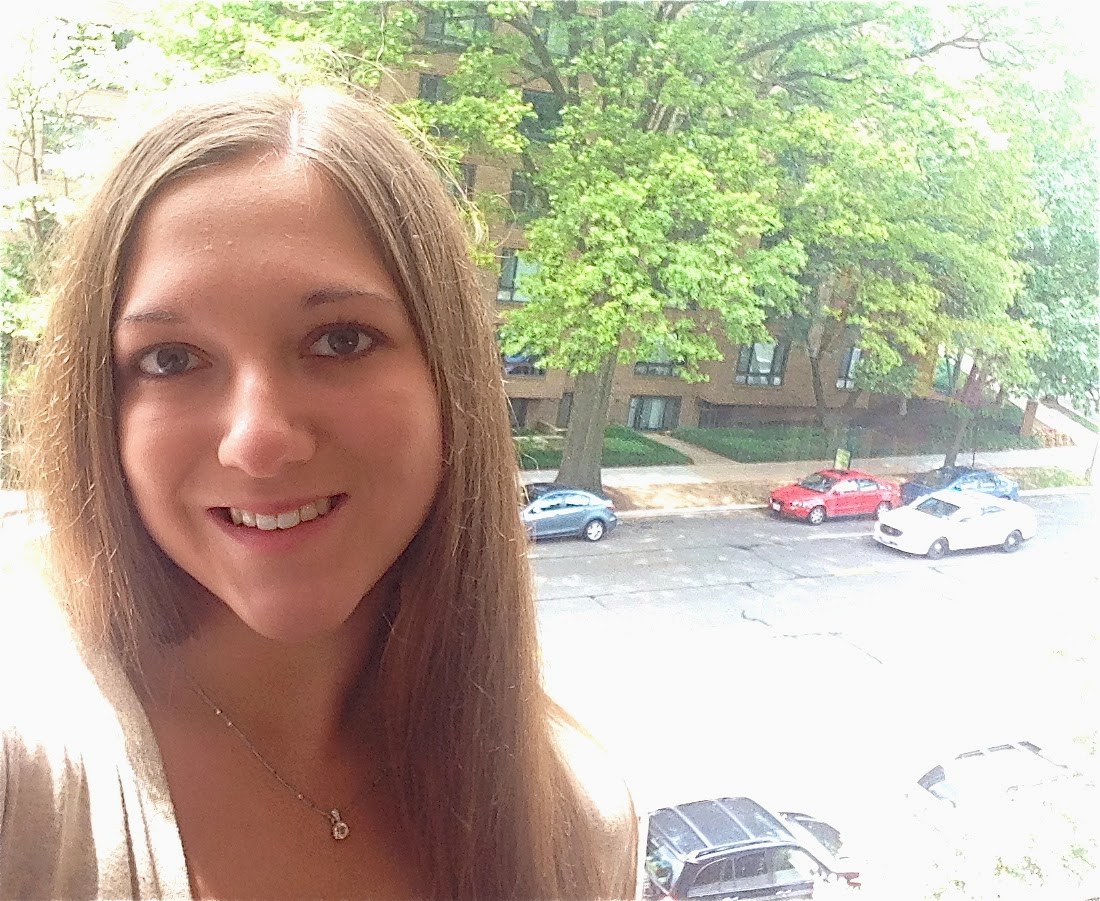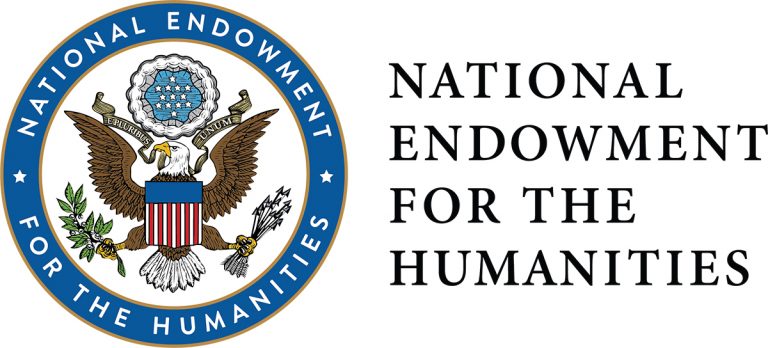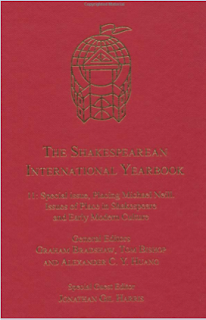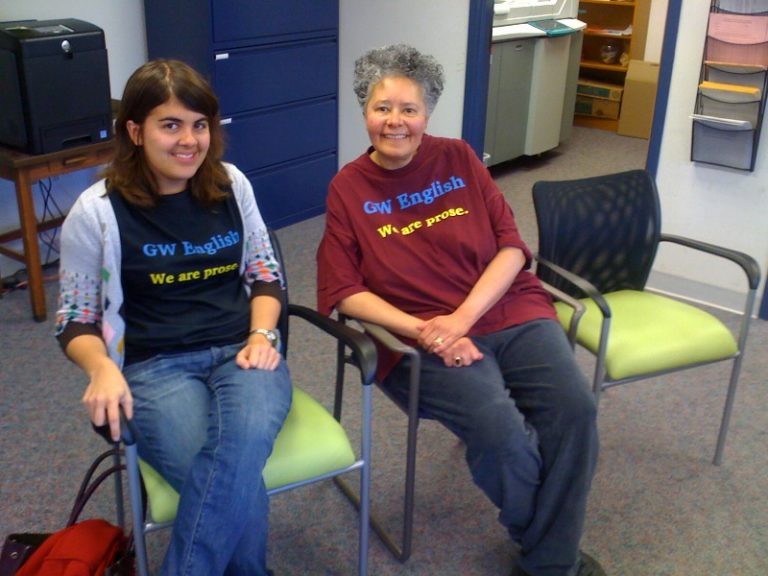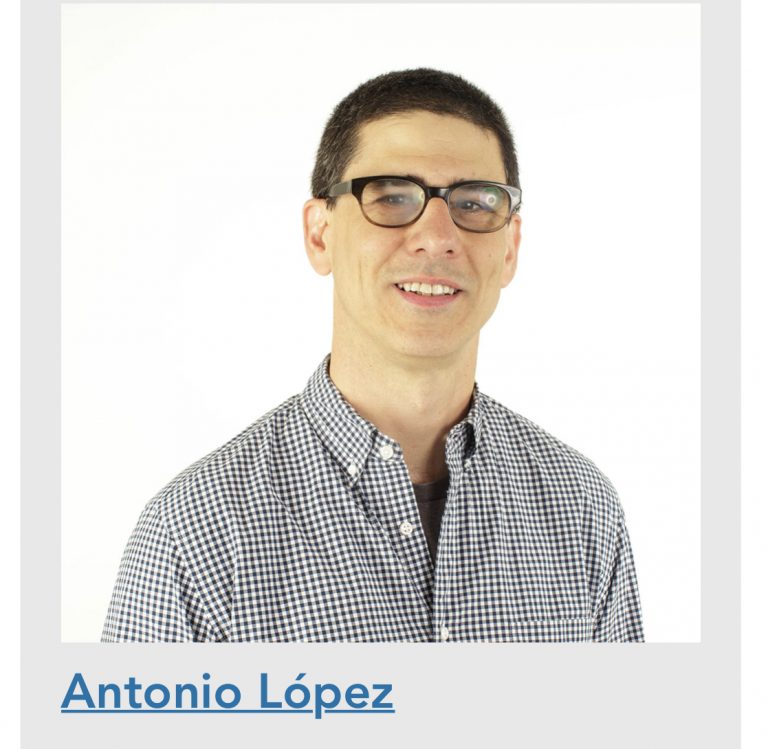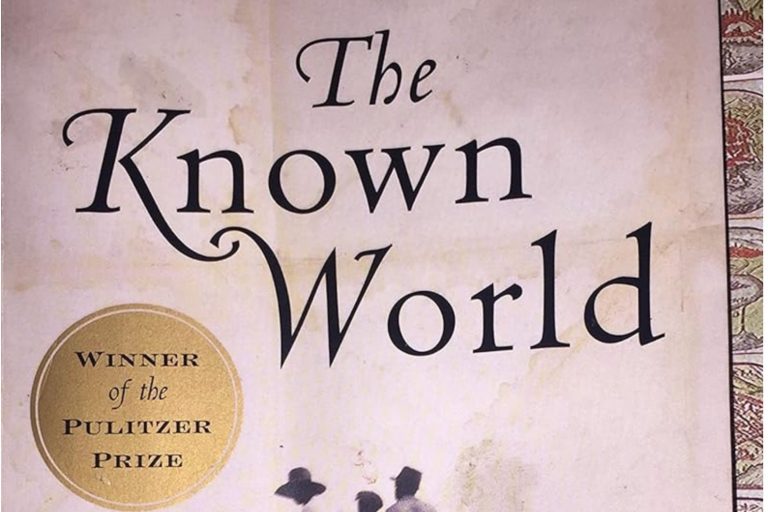In 2013, Joanna Falk double-majored in English and psychology, earning honors in both. We chatted with Joanna recently about the meaning and value of her English major, and about her current job and future plans.
GW English: Could you describe where you’re working right now, and what you’re doing?
JF: Right now, I work at a small labor law firm just a few blocks from GW. I actually worked there part-time as an Administrative Assistant since my sophomore year, but I started full-time in December 2013. My new title is “Research and Administrative Projects Manager” (which I made up). Now that I’m full-time, I perform more office managerial tasks and most of the same administrative assistant tasks I had done previously. I also conduct strategic research for the firm’s clients, and I am in charge of the administration of a political action committee.
I’m also doing some volunteering on the side – I work at the Friends of the Library book sale at Bethesda library; I am a Teaching Assistant in one of Montgomery College’s Adult ESOL classes; and I am the newsletter writer/editor for a therapeutic horseback riding center.
Have the skills and ways of thinking you learned through your English major factored into the work you’re doing now? If so, how?
Absolutely, those skills have helped me at work and even in my volunteering, particularly at Montgomery College. For instance, at work, one of the jobs I’m given on a regular basis is to outline a transcript from an arbitration hearing, and when I do that, I pay attention to the nuances in testimony, anticipating what sorts of implications can be used for my boss’ arguments in his brief. That type of skill is one I believe I fostered during my studies of English at GW.
We understand you’re going to apply to grad school in English. Could you share your thinking about that decision, as well as your thinking about where you’d like to apply and why? What in particular would you like to study? Are you interested in teaching eventually?
It’s been an anxiety-laden year, and mostly because I’ve been conflicted about which of my undergraduate majors to pursue in graduate school. I finally settled on English when I realized that, during this year of anxiety, the only way I’ve felt temporary but complete relief is through English. One of my GW professors, Margaret Soltan, has a MOOC on poetry, and in it I remember her saying that people turn to poetry to find meaning in their lives, and that the structure of a poem serves to undermine the seeming chaos of our lives. In this post-graduate year of uncertainty, that’s certainly been true for me. I feel fulfilled and the most engaged when I’m studying English. And by “studying” I mean writing, reading, reviewing past notes on literature, or any task that requires me to use those skills in a linguistic and critical sense. So, that’s how I decided on English.
 |
Joanna on the grounds of
Newnham College, Cambridge,
where Sylvia Plath (the subject of
Joanna’s GW thesis) attended. |
In regards to where I’d like to apply and why, I have certain programs in mind based on their faculty. For example, I wrote my undergraduate thesis on Sylvia Plath, and a Plath scholar named Linda Wagner-Martin taught for a number of years at the University of North Carolina Chapel Hill. That’s definitely on my list. There are also excellent programs nearby that I am applying to, such as University of Maryland College Park and Johns Hopkins University.
At the moment, I think I’d like to focus my studies on American modernist writing; those tend to be the authors I’m drawn to most. I am applying to PhD programs, most of which don’t ask you to pin down a concentration until a couple of years in. I’m applying to PhD programs, because I am interested in teaching at the university level. I know these are very competitive positions and that one needs to be willing to accept a job in a location that may not be the most desirable, but I’ve thought about it and feel willing to make that sacrifice so that I could have this kind of job.
Are there faculty in our department whom you consider mentors? If so, who, and why?
I take the word “mentor” very seriously, and I first want to say that there were many, many professors in the English department who I admire and who irrevocably changed my way of thinking (for the better) – Professor Katherine Howell, Professor Jonathan Gil Harris, Professor Supriya Goswami, Professor Tony López, Professor Jonathan Hsy, Professor Faye Moskowitz, Professor Marshall Alcorn… I really could go on and on.
That being said, I consider a “mentor” to be someone who not only expanded my mind during the time I was his/her student, but also someone who really went above and beyond what is required of a professor. Professors Jonathan Gil Harris and Tony López did that for me by suggesting I apply to the English Honors program. Even more so, Professor Margaret Soltan has been and continues to be my biggest mentor. When she was my professor and thesis advisor, she met with me far more frequently than she had to. She was involved in every step of my thesis, always suggesting new books and new angles to perfect it.
Do you have advice for current English majors at GW as they think about the future?
I would advise current English majors to listen and consider everything that’s being said about the crisis of the humanities, but continue to study what you love. In my experience, and in my friends’ experiences, the job market is tough for everyone right now, and you shouldn’t pursue a major or a degree just because you think it’ll help set you up for a high-paying, in-demand job. Just be prepared to fight for the field that you love, and if it’s English, then stick with it.
I would tell recent graduates to accept the fact that most of the plans they will make for themselves post-GW won’t pan out the way they expected them to, because we all really have much less control over our lives than we like to believe. Just roll with everything that happens; don’t let opportunities pass you by just because they don’t seem to quite fit in to your post-graduate master plan. Keep in touch with the professors who inspired you most. And as all these things happen to you (or don’t happen to you) after graduation, listen to yourself honestly and to how you’re reacting to all of it. It will be illuminating at least.
Thanks Joanna! And alums, we want to hear from you — please contact Professor Soltan, our alumni liaison, to make sure your stories are featured on this blog. She can be reached here.



